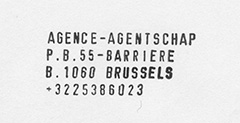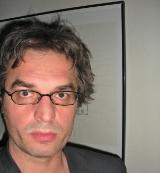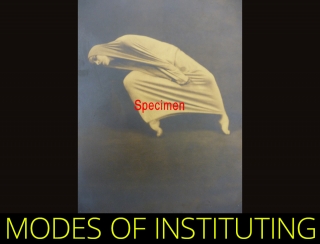Assembly (Modes of Instituting)
For Assembly (Modes of Instituting), Agency focuses on collectives. Copyright law revolved around the romantic notion of the author, who was believed to make expression through a predominantly individualistic manner. According to copyright law the contribution of the individual “author” justifies his or her status as the sole proprietor of an expression. Like this copyright has given rise to incomplete and misguided understandings of what creative processes involve, who takes part in it, and how its results ought to be rewarded. This conception of solitary authorship often seems to ignore the embeddedness of creation. Many artists have turned to non-profit organizations to support them in their artistic endeavors. Artists employ non-profit organization in order to support their creative working processes and hire themselves as salaried employees. What many seem to forget is that the copyrights mostly go with the non-profit organization. The rationale behind the “work for hire” doctrine is that when an employer hires an employee to create a copyrightable work, the fruits of the employee's endeavors properly belong to the employer, the non-profit. Only exceptionally reciprocal relationships between artists and patrons, audiences, models, actors, technicians, assistants, researchers, etc... result also in joint authorship.
On the first day Agency propose a selection from the list of things specific for Modes of Instituting. Thing 000955 (Martha Graham’s choreographies). In the late 1920s, Graham founded a dance company. In 1948 Martha Graham incorporated a not-for-profit corporation called Martha Graham Center of Contemporary Dance. The purpose of the center was to free Graham from the burden of administrative aspects so that she could devote her self more to the creative aspects of dance. The choreographer was hired by the center to create choreographies. In 1991 in her last will, Graham named Protas her executor and bequeathed to him her personal property and her residuary estate, including “any rights or interests in any dance works, musical scores, scenery sets, [Graham's] personal papers and the use of [Graham's] name. Protas claimed all the rights in Graham’s choreographies. But because of the works for hire doctrine the center claimed that all rights belonged to the center. Protas argued that the work for hire doctrine was inapplicable because of Graham's central role with the center. During the case Martha Graham School and Dance Foundation, Inc. v. Martha Graham Center of Contemporary Dance, the court had to decide if the right went the artist or the institution created by the artist. Possibly also other cases involving working relationships and artistic control in legacies will be discussed like for example Thing 000798 (Third World America) and Thing 002334 (Captain America and other drawings by Jack Kirby).
On the second day of the workshop we will have a discussion with Stefan Nowotny, who teaches at Goldsmiths, University of London, and has been involved in various research projects of the eipcp – European Institute for Progressive Cultural Policies. He has a long-standing interest in new constellations of critical knowledge production and collaborative modes of practice across disciplinary boundaries. The discussion will, on the one hand, take its clue from the notion of instituent practices (as proposed in Nowotny/Raunig, Instituierende Praxen. Bruchlinien der Institutionskritik, 2008) and, one the other, focus on the question of an ecology of practices (as termed by Isabelle Stengers). One main interest here will be the interrelationship between a micropolitics of the infra-institutional and the desire to open up spaces and times of exchange between different or divergent practices.
On the third day we will look into the legal persona of cooperatives as an alternative to the capitalist mode of production. Cooperatives are collective enterprises owned, controlled and run by and for their members to realize shared economic, social, ecological goals and aspirations. We will discuss examples like Mondragon, Coop, etc… and artist run cooperatives like mutantspace.ie, etc...

BIOGRAPHY
Agency is an international initiative that was founded in 1992 and has office in Brussels. It constitutes a growing list of “boundary things” that resist the radical split between the classifications of nature and culture. This list is mostly derived from controversies and juridical cases involving intellectual property (copyrights, patents, trade marks, publicity rights, etc...) from the start of the enclosures of the commons around the 17th century until today and from various territories of world integrated capitalism. The colonial concept of intellectual property relies upon the fundamental assumption of the split between culture and nature and consequently between expressions and ideas, creations and facts, subjects and objects, humans and non-humans, originality and tradition, individuals and collectives, mind and body, etc... Each controversy, included on the list, witnesses a resistance in terms of these divisions. Agency calls these “boundary things” forth from its list in varying “assemblies”, which combine the formats of exhibition, performance and publication. Each assembly speculates around possible inclusions. All of Agency’s assemblies look at the operative consequences of the apparatus of intellectual property for an ecology of diverse art practices and aim at caring for practices their singular modes of existence.
 Stefan Nowotny was trained as a philosopher (PhD in Philosophy, University of Leuven, Louvain-la-Neuve). His research focuses mainly on political theory, the linguistic and social complexities of translation and the entanglements of historical and contemporary epistemologies and imaginaries. While his writing deals with a range of especially philosophical and political topics, he has also repeatedly worked in collaborative art/theory projects. Dr Stefan Nowotny teaches in the PhD programme Curatorial/Knowledge at Goldsmiths, University of London, and supervise research projects on the curatorial, collaborative and participatory modes of art and knowledge production, institutional critique and new institutional forms, the differentiality of postcolonial conditions, and contemporary political practices.
Stefan Nowotny was trained as a philosopher (PhD in Philosophy, University of Leuven, Louvain-la-Neuve). His research focuses mainly on political theory, the linguistic and social complexities of translation and the entanglements of historical and contemporary epistemologies and imaginaries. While his writing deals with a range of especially philosophical and political topics, he has also repeatedly worked in collaborative art/theory projects. Dr Stefan Nowotny teaches in the PhD programme Curatorial/Knowledge at Goldsmiths, University of London, and supervise research projects on the curatorial, collaborative and participatory modes of art and knowledge production, institutional critique and new institutional forms, the differentiality of postcolonial conditions, and contemporary political practices.